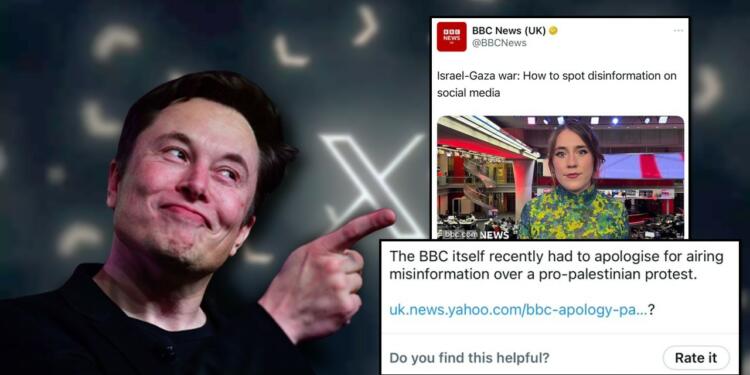Elon Musk, might have made 99 mistakes out of 100, but when it comes to taking the reins of Twitter, he sure hit the bullseye. Since Musk’s takeover, Twitter has undergone a miraculous transformation, now known as X, and it has become a thriving, open social media hub. This transformation is nothing short of a dream come true for meme enthusiasts and opinion shapers from all walks of life. But if you’re a purveyor of fake news, well, you might as well be in a world of trouble!
Nobody understands this better than the BBC, which has gained global recognition, not for its impeccable journalism, but for being the butt of jokes on X, and peddling fake news at the drop of a hat. Just recently, the BBC tried to play the hero by posting an article titled “How to spot disinformation on social media.” But X wasn’t too thrilled with that.
In a move that can only be described as epic trolling, X attached a little tag that read, “The BBC itself recently had to apologize for airing misinformation over a pro-Palestinian protest.” Ouch! Trolling a heavyweight global media entity like that is just classic Elon Musk.
https://twitter.com/NorbertElikes/status/1716139485518520506
Elon Musk has truly worked his magic on Twitter, or should I say, X. From the scourge of “Manipulated Media” under Dorsey’s Twitter to introducing “Misinformation Tags” to call out the fake news peddlers and their propaganda, Twitter has come a long way under Musk’s leadership.
Interestingly, the author of the controversial BBC article, Marianna Spring, has an India connection too. During a time when India was grappling with the second wave of the pandemic, she had her sights set on the Indian community, particularly the “delta variant” of the deadly COVID-19 virus.
Also read: X blocks Hindu hating IAMC and HFHR accounts in India
On May 18, 2021, she took to Twitter and claimed, “Concerns over vaccine hesitancy leading to hospitalizations in Bolton – where the India variant has spiked – have raised questions about the impact of online anti-vaccine content.” But as it turned out, her claims didn’t hold water.
To make matters more interesting, just a couple of months ago, the same journalist faced allegations of embellishing her CV to secure a job at the BBC. And to add an extra layer of irony, she’s a part of the disinformation team at the BBC. Irony seems to have met its demise right there!
Under Musk’s guidance, X has become a platform where the line between fact and fiction is more apparent than ever. It’s like a battlefield for truth and untruth, and Elon’s hand can be seen in every facet of this transformation.
Now, let’s talk about how X has turned into a haven for memers. It’s like an amusement park for those who love creating and sharing memes. But it’s not just a paradise for memers; it’s also a thriving platform for opinion makers from all walks of life. From political commentators to scientists, from artists to everyday folks, X has something for everyone. It’s a place where opinions flow freely, and discussions take on a life of their own.
And while X has been a boon for creativity and free expression, it has also turned into a nightmare for those who peddle fake news. The introduction of “Misinformation Tags” has made it much harder for false information to spread unchecked. It’s like a digital sheriff keeping a vigilant eye on the wild west of the internet.
The case of the BBC and Marianna Spring is a prime example of how X has become a force to be reckoned with. It’s no longer a one-way street where media giants can dictate the narrative. X has given the power back to the people, and it’s holding everyone accountable, regardless of their stature. So, whether you love memes, enjoy expressing your opinions, or just want a dose of unvarnished truth, X is the place to be. And Elon Musk, with all his quirks, has certainly made Twitter great again.
Support TFI:
Support us to strengthen the ‘Right’ ideology of cultural nationalism by purchasing the best quality garments from TFI-STORE.COM.
























